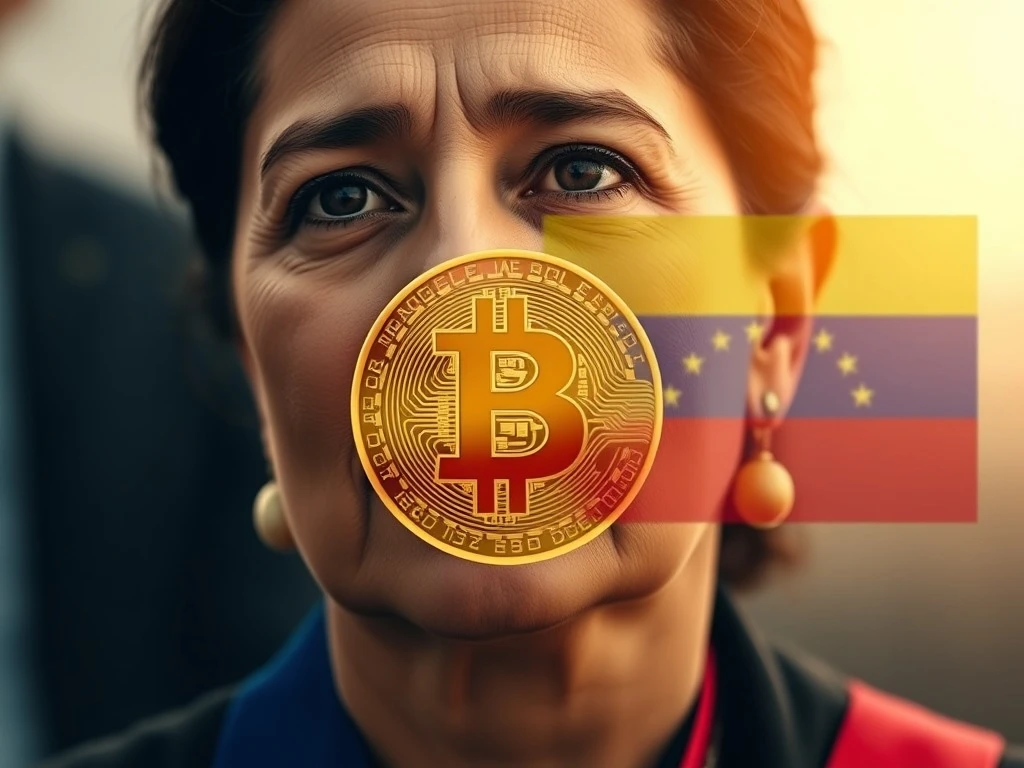Bitcoin’s Beacon: María Corina Machado’s Nobel Peace Prize Highlights Freedom and Human Rights

The global cryptocurrency community often discusses the transformative potential of digital assets. However, the recent announcement of **María Corina Machado** winning the **Nobel Peace Prize** truly underscores this impact. This Venezuelan human rights activist and opposition leader has powerfully advocated for **Bitcoin** as a critical tool. She views it as a lifeline for individuals facing economic hardship and political repression. Her recognition elevates the conversation around **Bitcoin** from a mere financial instrument to a symbol of freedom and resistance worldwide.
María Corina Machado: A Champion for Venezuelan Freedom and Bitcoin Adoption
María Corina Machado, a prominent figure in Venezuelan politics, has consistently championed democratic principles. Her tireless efforts against authoritarian rule in Venezuela earned her the prestigious **Nobel Peace Prize** for promoting democracy. In a 2024 interview with Alex Gladstein, Chief Strategy Officer at the **Human Rights Foundation**, Machado articulated her profound belief in **Bitcoin’s** utility. She described how many Venezuelans found a crucial lifeline in **Bitcoin** during periods of extreme hyperinflation. This digital currency allowed them to protect their dwindling wealth and even finance their escape from the country. Furthermore, **Bitcoin** bypasses government-imposed exchange rates, offering a vital means of economic survival for many citizens.
Machado’s advocacy extends beyond personal financial protection. She views **Bitcoin** as an evolving humanitarian tool. It has become a significant means of resistance against oppressive state controls. She asserts that ensuring property rights, maintaining low inflation, guaranteeing equal access to opportunity, and fostering good governance are essential for Venezuela’s poorest citizens. Therefore, **Bitcoin** directly supports these fundamental principles by providing an alternative to a failing fiat system. Her insights highlight the tangible benefits of decentralized digital currencies in volatile political and economic landscapes. Many critics, however, suggest that the Venezuelan opposition movement acts as a tool of foreign interests. For example, reports indicate that five Venezuelan opposition leaders met with a US Secretary of State to discuss regime change plans.
Bitcoin: A Lifeline Against Hyperinflation and Currency Controls
The experience in Venezuela serves as a stark example of **Bitcoin’s** real-world utility. When national currencies lose their value rapidly due to hyperinflation, citizens desperately seek stable alternatives. Traditional banking systems often become unreliable or inaccessible. Additionally, strict government currency controls further limit financial freedom. In this challenging environment, **Bitcoin** emerges as a powerful solution. It allows individuals to preserve their wealth in a censorship-resistant asset. Moreover, it enables cross-border transactions without relying on state-controlled financial intermediaries. This capability is especially crucial for those attempting to send remittances or secure funds for relocation.
Political activists and resistance movements globally increasingly recognize **Bitcoin’s** potential. They use it to circumvent state surveillance and confiscation of funds. **Bitcoin’s** decentralized nature means no single entity controls it. This characteristic makes it highly resilient to government interference. Thus, it offers a secure and private way to fund operations and support individuals. Jack Dorsey, a well-known tech entrepreneur, has also urged tax-free status for ‘everyday’ **Bitcoin** payments. This suggestion further emphasizes the growing recognition of **Bitcoin’s** role in empowering ordinary citizens and fostering economic liberty.
Peer-to-Peer Technology: Empowering Decentralized Resistance
Beyond **Bitcoin** itself, the underlying **peer-to-peer (P2P)** technology represents a broader shift in power dynamics. This technology is emerging as an invaluable tool for political opposition movements. These groups often contend with state governments’ monopoly on force. The Canadian trucker convoy protests in 2022 provide a compelling illustration. When the Canadian government froze protesters’ bank accounts and funding sources, they turned to **Bitcoin**. A federal judge later ruled these government actions unconstitutional. While Canadian authorities managed to seize some **Bitcoin** sent through centralized channels, the majority remained unconfiscated. This was because it was transferred via decentralized, **peer-to-peer** methods, making the funds immune to seizure.
Similarly, **P2P networks** offer solutions for communication during state crackdowns. In September, protesters in Nepal faced a government shutdown of social media. They then utilized Jack Dorsey’s Bitchat application. This innovative **peer-to-peer** encrypted messaging network uses Bluetooth to form a communication mesh. Bitchat transforms each connected phone into a relay node for messages. Importantly, it does not rely on the internet, allowing it to function even during a complete internet blackout. This highlights the versatility of **decentralized** technologies. They offer robust alternatives for both financial transactions and critical communication in times of crisis. The **Human Rights Foundation** actively supports the development and adoption of such tools.
The Enduring Impact of Decentralization and Bitcoin on Human Rights
The story of **María Corina Machado’s Nobel Peace Prize** win intertwines deeply with the narrative of **decentralization** and **Bitcoin’s** growing influence. Her recognition validates the crucial role that permissionless, borderless digital currencies play in safeguarding human rights. In countries like Venezuela, where economic stability and individual freedoms are constantly under threat, **Bitcoin** offers a tangible pathway to resilience. It provides a means for people to protect their savings and maintain a degree of autonomy.
Ultimately, the principles that **Bitcoin** embodies—transparency, censorship resistance, and individual sovereignty—are becoming increasingly vital. As governments worldwide exert more control over traditional financial and communication channels, **decentralized** alternatives gain prominence. The global adoption of **Bitcoin** and **P2P technologies** will likely continue to expand. This expansion will be driven by individuals and groups seeking to uphold their fundamental rights against state overreach. The **Human Rights Foundation** will undoubtedly continue its work, promoting these tools as essential components of modern human rights advocacy. Therefore, Machado’s award serves as a powerful reminder of **Bitcoin’s** potential to foster a more equitable and free world.








